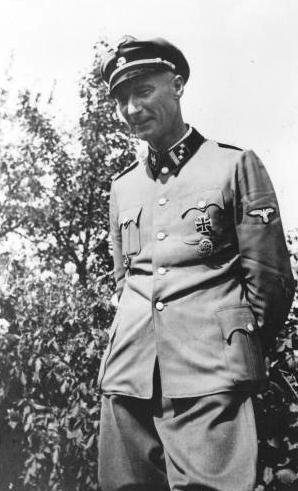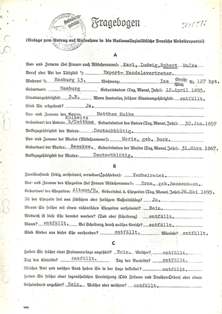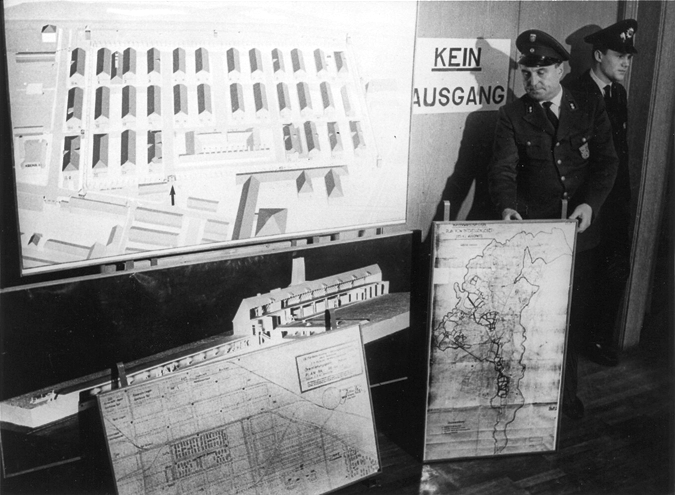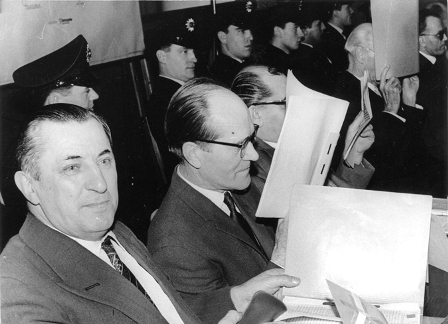Holocaust Education & Archive Research Team |
|
Other Camps
Key Nazi personalities in the Camp System The Labor & Extermination Camps
Auschwitz/Birkenau Jasenovac Klooga Majdanek Plaszow The Labor Camps
Trawniki
Concentration Camps
Transit Camps
| |||
Robert Mulka The man who knew nothing about Auschwitz
Robert Mulka was born on the 12 April 1895 in Hamburg, Germany: the son of a postal employee. After completing Realschule and a year of army service he served an apprenticeship in a business firm. In August 1914 he volunteered for the army that fought in World War One, serving in France, Russia and Turkey, and he rose to the rank of lieutenant.
After the war ended in November 1918, he joined the Baltic Guard, a right-wing paramilitary force, “to prevent the advance of Bolshevism in the West.” He returned to Hamburg in 1920, returning to the business community, that same year the Hamburg District Court sentenced him to eight months imprisonment and two years loss of civil rights for failing to account for funds confiscated by him in the Baltic, a charge Mulka fiercely contested.
In 1931, he founded his own import –export business whilst remaining a reserve officer, taking part in manoeuvres, he was promoted to first lieutenant, but after his conviction, he was expelled from the army reserve. Mulka joined the Waffen- SS and he was assigned to serve in Auschwitz concentration camp at the beginning of 1942, where so he was told, “a large prison camp with a farm had to be supervised.”
In May 1942 he became Commandant Hoess’s adjutant and he was arrested in March 1943 for making a critical remark about a speech made by Dr Paul Josef Goebbles, the Propaganda Minister, but was released a short time later and the proceedings against him dropped. He returned to Hamburg on leave, and when the Allies commenced their bombing campaign he volunteered for the SS North Sea command. In early 1944, he was transferred to an SS engineer school near Prague.
Mulka became ill and once more he was granted home leave, and he returned to Hamburg, where he stayed until the Nazis capitulated in May 1945. Between the 8 June 1945 and the 28 March 1948 he was interned in various camps, such as, Iserbrook, Neumunster, Eselheide/ Paderborn, as well as in the War Criminal camps at Fischbek and Neuengamme.
A Hamburg de-Nazification chamber sentenced him to eighteen months imprisonment, “for familiarity with the events in Auschwitz,” but the sentence was reviewed and Mulka was put into Category V, which allowed him a free access to employment without restrictions.
Mulka was married, the father of a son and daughter, another son died during the Second World War, and when the Auschwitz trial started in December 1963 worked for an export firm founded by him and since transferred to his son.
At his trial in Frankfurt, Mulka claimed he knew nothing about the fact that many prisoners seemed to be dying and of course he issued no orders that had any connection to the murder or death of Jews or Gypsies at Auschwitz.
He claimed that the atmosphere at Aushwitz disgusted him stating things that occurred there shocked him from the very beginning. When asked what specifically shocked him he mentioned the striped cloths of the prisoners.
"Just the striped clothes?" the judge asked.
"The SS men in Auschwitz had no class, no style" he replied.
When questioned about his role as second in command of the camp in 1942 he stated he worried a lot about whether or not the camp could afford some entertainers he wished to bring in.
When questioned about the gassing of Jews he stated:
"Gas chambers? Yes I had heard something about gas chambers through the grapevine, overtime word of this got around. I wondered about the red glow and smoke and the rumours that these were the fires burning in the crematorium."
When pressured as to why he didn't investigate further or perhaps inquire further her stated:
Who was I to ask? No one would answer such questions, and Hoess was an Opaque man" he did admit that there were some general instructions regarding the "special treatment" and disinfection of "asocial and undesirable elements" but these were only vague details and of course they bypassed his department.
When confronted with orders regarding treatment of Jews, and the procurement documents for the gas Zyklon B and the construction orders for gas ovens that he himself had signed personally, he offered no response.
Nor did he have much to add in regards to his notification dispatches relating to to the imminent arrival of transports from Hungary who would later be gassed at Birkenau. Instead he maintained that his role was purely administrative and he had never mistreated anyone during his time at Aushwitz.
However, Alexander Princz, a deliverty coachman who visited all the camps, testified about an incident involving Mulka:
“There is something else about the commandant who substituted for Hoess. There was a wooden bridge between Auschwitz and Birkenau. There were three of us drivers, and an SS man accompanying us.
About 1,000 feet before the bridge Mulka overtook us in the commandant’s car and 300 feet in front of us he stopped before two SS men and two prisoners. Mulka asked, “Whats that?”
They got hold of this, one of the SS men said and showed him something. The prisoners had already been beaten and were covered with blood, and Mulka shouted: “Shoot the dogs.”
One hadn’t been fatally wounded and tried to get up again. Whereupon Mulka pulled out his pistol and himself shot him again. He rode off and we had to take the bodies to Birkenau.
Judge Hofmeyer asks the defendants to line up in front of the judge’s bench for a confrontation with the witness.
“Which of them was the man?” the Judge asks the witness.
Princz identifies Broad, Bednarek, Boger and Kaduk. He walks by the defendants three or four times, then stops in front of Mulka and says: “This is he,” in front of Stark he says: “Him I know also.”
Robert Mulka, former SS- Hauptsturmfuhrer, was found guilty at the Auschwitz trial in Frankfurt –am –Main of complicity in the murder of 750 persons each on at least four separate occasions, and was sentenced to a total of 14 years imprisonment at hard labour.
Sources:
Auschwitz by Bernd Nauman, published by Pall Mall Press Auschwitz Chronicle by Danuta Czech, Henry Holt and Co New York 1989 KL Auschwitz – Seen by the SS Auschwitz Museum 1978 The Auschwitz Album – Yad Vashem & Auschwitz- Birkenau State Museum 2002 Wiener Library 1173/10 Copy statement re the activities of Oswald Kaduk in Auschwitz by Zdzislaw Wieczorek (3 Aug 1959) copy nd Holocaust Historical Society The Frankfurt Auschwitz Trial, 1963–1965 Genocide, History and the Limits of the Law
Copyright. 2009 Jonathan Williams, Chris Webb and Carmelo Lisciotto H.E.A.R.T
|



